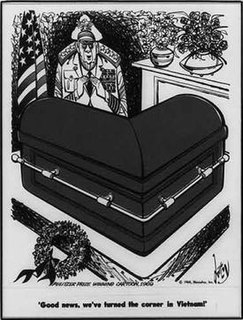Related Research Articles

This Pulitzer Prize has been awarded since 1942 for a distinguished example of reporting on international affairs, including United Nations correspondence. In its first six years (1942–1947), it was called the Pulitzer Prize for Telegraphic Reporting - International.

Newsday is an American daily newspaper that primarily serves Nassau and Suffolk counties on Long Island, although it is also sold throughout the New York metropolitan area. The slogan of the newspaper is "Newsday, Your Eye on LI", and formerly it was "Newsday, the Long Island Newspaper". The newspaper's headquarters is in Melville, New York, in Suffolk County. Newsday has won 19 Pulitzer Prizes and has been a finalist for 20 more.

Lawrence Rush "Rick" Atkinson IV is an American author, most recently of The British Are Coming: The War for America, Lexington to Princeton, 1775–1777, the first volume in the Revolution Trilogy. He has won Pulitzer Prizes in history and journalism.
Jimmie Lee Hoagland is a Pulitzer prize-winning American journalist. He is a contributing editor to The Washington Post, since 2010, previously serving as an associate editor, senior foreign correspondent, and columnist.
The following are the Pulitzer Prizes for 1992.
Walt Bogdanich is an American investigative journalist and three-time recipient of the Pulitzer Prize.

Thomas Francis Darcy was an American political cartoonist. While working at Newsday, he won the 1970 Pulitzer Prize for Editorial Cartooning.
Tom McGinty is a Pulitzer Prize-winning investigative journalist known for his use and advocacy of computer-assisted reporting.
Gaylord Dewayne Shaw was an American journalist who won a Pulitzer Prize for National Reporting in 1978.

David Nathaniel Philipps is an American journalist and author whose work has largely focused on the human impact of the wars in Iraq and Afghanistan. He is a national correspondent for The New York Times and is the author of three non-fiction books. His work has been awarded The Pulitzer Prize twice, most recently in 2022.
Stephanie Saul is a Pulitzer Prize winning journalist known for her work at Newsday and The New York Times.

Ovie Carter was an American photographer for the Chicago Tribune from 1969 to 2004. He won the Pulitzer Prize for International Reporting for his coverage of famine in Africa and India together with a reporter William Mullen.
William Mullen was a reporter and correspondent for the Chicago Tribune, which he joined in 1967 and retired from in 2012. In 1972, he worked undercover in the Chicago Board of Election Commissioners, uncovering massive evidence of voting irregularities that resulted in 82 election officials being indicted by the federal government. The exposé was awarded the Pulitzer Prize for general local reporting in 1973. In 1975, Mullen and Chicago Tribune photographer Ovie Carter were awarded the Pulitzer for International Reporting for a six-part series on world hunger and famine.
Laurence Edmund Allen was an American journalist for the Associated Press from 1933 to 1961. He won the first Pulitzer Prize for Telegraphic Reporting in 1942 for his coverage of the British Mediterranean Fleet.
Loren Jenkins is a war correspondent for the Washington Post who won a 1983 Pulitzer Prize for International Reporting "for reporting of the Israeli invasion of Beirut and its tragic aftermath".
Dennis Bell was an American journalist, best known for his award-winning series of the articles on famine in Ethiopia in 1984 for Newsday.
Lewis M. Simons is an American Pulitzer Prize-winning correspondent on foreign affairs throughout Southeast Asia and the Middle East.
Daniel De Luce was an American journalist for the Associated Press from 1929 to 1976. He won a Pulitzer Prize in 1944.
Price Day (1907-1978) was a war correspondent for the Baltimore Sun who won a 1949 Pulitzer Prize for International Reporting.
Paul William Ward (1905-1976) was a Baltimore Sun correspondent who won a Pulitzer Prize for his overseas reporting "Life in the Soviet Union" in 1948.
References
- 1 2 3 4 5 6 7 Matt Schudel (2019-02-08). "Patrick J. Sloyan, Pulitzer-winning journalist who exposed friendly fire deaths in Gulf War, dies at 82". The Washington Post. Retrieved 2020-11-16.
- 1 2 3 4 5 6 Brennan 1999.
- 1 2 3 4 5 6 B. Jones (2019-02-06). "Patrick Sloyan, Newsday Pulitzer winner, dies at 82". Newsday. Retrieved 2020-11-16.
- 1 2 3 Fischer H. 2002.
- ↑ "When Reagan Sent In the Marines". Macmillan. 2019. Retrieved 2020-11-16.
- ↑ "Patrick J. Sloyan". Macmillan Australia. 2020. Retrieved 2020-11-16.
- ↑ "The Politics of Deception". Macmillan. 2020. Retrieved 2020-11-16.
- ↑ "Patrick Sloyan". National Cable Satellite Corporation. 2015-11-17. Retrieved 2020-11-16.
- ↑ "Patrick J. Sloyan". Macmillan. 2020. Retrieved 2020-11-16.